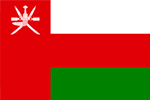
Population
5M+
CHRISTIAN PERSECUTION STATUS
high
Persecution
CHRISTIAN POPULATION
3.6%
Status of
the church
In Oman, 75% of the 3 million population are Ibadhi Muslim. The remaining quarter comprises Sunni and Shiite Muslims. There are Hindus and a small Christian minority, too. (CIA World Factbook) Over 98% of Oman’s Christian population are expatriates situated in urban areas, and there are over 100 registered denominations.
There is no constitution in Oman, so freedom of religion is not recognized officially. However, discrimination based on religion is illegal. It is against the law to proselytize, as well as print non-Muslim materials within Oman. Religious organizations must be registered with the state and are only permitted to practice in designated areas.
Oman is considered to be one of the most developed countries in the region. Recently, it has faced an increase in unemployment, now at 15% (CIA World Factbook), and scrutiny from human rights organizations such as Amnesty International for its treatment of civilian protestors. Interference in citizens’ freedom of expression and speech is illegal, although criticism of the monarchy is not permitted.
The literacy rate in Oman is an average of 81.4% (CIA World Factbook), and internet users make up almost half of the population at 1.45 million.
Location
Prayer points
What our viewers are saying